Would you mind的用法
- 格式:ppt
- 大小:1.20 MB
- 文档页数:4
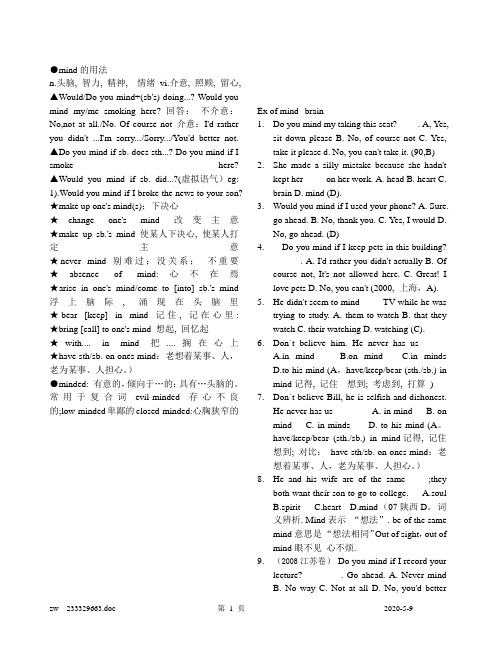
●mind的用法n.头脑, 智力, 精神, 情绪vi.介意, 照顾, 留心, ▲Would/Do you mind+(sb's) doing...? Would youmind my/me smoking here? 回答:不介意:No,not at all./No. Of course not 介意:I'd rather you didn't ...I'm sorry.../Sorry.../You'd better not. ▲Do you mind if sb. does sth...? Do you mind if I smoke here? ▲Would you mind if sb. did...?(虚拟语气)eg: 1).Would you mind if I broke the news to your son? ★make up one's mind(s);下决心★change one's mind 改变主意★make up sb.'s mind 使某人下决心, 使某人打定主意★never mind 别难过;没关系;不重要★absence of mind:心不在焉★arise in one's mind/come to [into] sb.'s mind 浮上脑际, 涌现在头脑里★bear [keep] in mind 记住, 记在心里: ★bring [call] to one's mind 想起, 回忆起★with.... in mind 把....搁在心上★have sth/sb. on ones mind:老想着某事、人,老为某事、人担心。
)●minded: 有意的,倾向于…的:具有…头脑的。
常用于复合词evil-minded存心不良的;low-minded卑鄙的closed-minded:心胸狭窄的Ex of mind--brain1.Do you mind my taking this seat? ____. A, Yes,sit down please B. No, of course not C. Yes, take it please d. No, you can't take it. (90,B) 2.She made a silly mistake because she hadn'tkept her ____ on her work. A. head B. heart C.brain D. mind (D).3.Would you mind if I used your phone? A. Sure.go ahead. B. No, thank you. C. Yes, I would D.No, go ahead. (D)4.---Do you mind if I keep pets in this building?---____. A. I'd rather you didn't actually B. Of course not, It's not allowed here. C. Great! I love pets D. No, you can't (2000, 上海,A). 5.He didn't seem to mind ____ TV while he wastrying to study. A. them to watch B. that they watch C. their watching D. watching (C).6.Don`t believe him. He never has us _____A.in mindB.on mindC.in mindsD.to his mind (A。
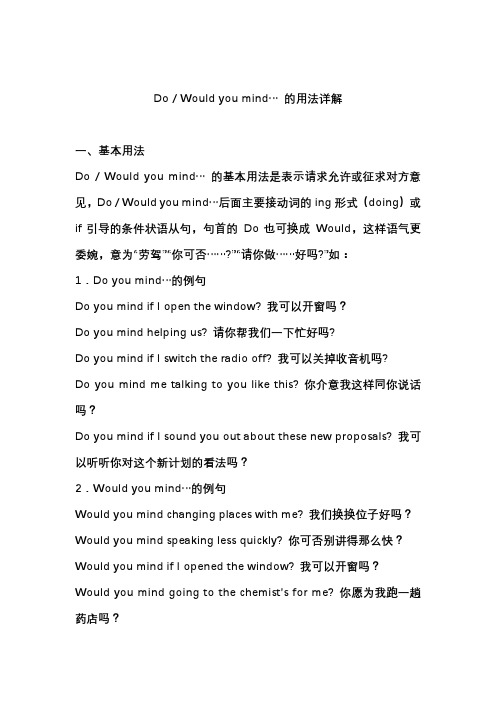
Do / Would you mind… 的用法详解一、基本用法Do / Would you mind… 的基本用法是表示请求允许或征求对方意见,Do / Would you mind…后面主要接动词的ing形式(doing)或if引导的条件状语从句,句首的Do也可换成Would,这样语气更委婉,意为“劳驾”“你可否……?”“请你做……好吗?”如:1.Do you mind…的例句Do you mind if I open the window? 我可以开窗吗?Do you mind helping us? 请你帮我们一下忙好吗?Do you mind if I switch the radio off? 我可以关掉收音机吗?Do you mind me talking to you like this? 你介意我这样同你说话吗?Do you mind if I sound you out about these new proposals? 我可以听听你对这个新计划的看法吗?2.Would you mind…的例句Would you mind changing places with me? 我们换换位子好吗?Would you mind speaking less quickly? 你可否别讲得那么快?Would you mind if I opened the window? 我可以开窗吗?Would you mind going to the chemist’s for me? 你愿为我跑一趟药店吗?Would you mind looking over my exercises? 请你帮我看一下我的练习好吗?二、搭配用法该句型的搭配应注意以下几点:1. 其后可接if 从句,但不接whether从句。
2. 其后可接动名词,但不接不定式。
如:Would you mind helping me? 请帮帮我的忙好吗?Do you mind my closing the window? 我关上窗户行吗?3. 可说Do you mind… 或Would you mind…,但不说Will you mind…。

谈谈“Would you mind……? ”句型2019-09-03“Would you mind...?”句型是交际⽤语中常⽤句型之⼀。
“Would you mind...?” 意为“你介意做……吗?”,汉语常常译为“做……你不反对/介意吗?”,⽤来征询对⽅对某⼀件事的同意或许可,是⼀种⽐较客⽓的表达⽅法。
其⽤法有以下⼏点值得注意:1. “Would you mind...?” 的意思是“请你……好吗?”,常⽤来表⽰⼀种有礼貌的请求,后接动名词,不接动词不定式结构。
例如: Would you mind closing the door?请把门关上好吗?Would you mind giving me a glass of water?请你给我⼀杯⽔好吗?Would you mind opening the windows?打开窗户你介意吗?2. “Would you mind...?” 后接从句时,从句中的谓语动词常⽤过去时,表⽰委婉的语⽓。
例如:Would you mind if I closed the window?你介意我把窗户关上吗?Would you mind if I turned up the radio?我把收⾳机声⾳开⼤点,你反对吗?3. “Would you mind...?” 的否定式通常是在mind后⾯加not,与后⾯的动名词构成动名词的否定式。
例如:Would you mind not swimming in the river?请你不要在河⾥游泳好吗?Would you mind not being late again?请你不要再迟到好吗?4. “Would you mind...? ”的同义句型是“Do you mind...?”,两种句型意思相同,只是“Would you mind...?” ⽐“Do you mind ...?”语⽓显得更客⽓、委婉⼀些。
两者后接从句时,前者从句中的动词常⽤过去时,⽽后者从句中的动词则⽤⼀般现在时。
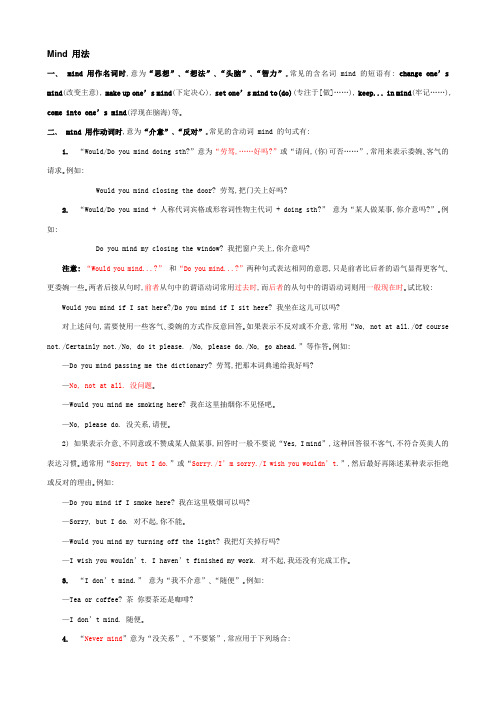
Mind 用法一、 mind 用作名词时,意为“思想”、“想法”、“头脑”、“智力”。常见的含名词 mind 的短语有: change one’s mind(改变主意), make up one’s mind(下定决心),set one’s mind to(do)(专注于[做]……), keep... in mind(牢记……), come into one’s mind(浮现在脑海)等。二、 mind 用作动词时,意为“介意”、“反对”。常见的含动词 mind 的句式有:1. “Would/Do you mind doing sth?”意为“劳驾,……好吗?”或“请问,(你)可否……”,常用来表示委婉、客气的请求。例如:Would you mind closing the door? 劳驾,把门关上好吗?2.“Would/Do you mind + 人称代词宾格或形容词性物主代词+ doing sth?” 意为“某人做某事,你介意吗?”。例如:Do you mind my closing the window? 我把窗户关上,你介意吗?注意: “Would you mind...?”和“Do you mind...?”两种句式表达相同的意思,只是前者比后者的语气显得更客气、更委婉一些。两者后接从句时,前者从句中的谓语动词常用过去时,而后者的从句中的谓语动词则用一般现在时。试比较: Would you mind if I sat here?/Do you mind if I sit here? 我坐在这儿可以吗?对上述问句,需要使用一些客气、委婉的方式作反意回答。如果表示不反对或不介意,常用“No, not at all./Of course not./Certainly not./No, do it please. /No, please do./No, go ahead.”等作答。例如:—Do you mind passing me the dictionary? 劳驾,把那本词典递给我好吗?—No, not at all. 没问题。—Would you mind me smoking here? 我在这里抽烟你不见怪吧。—No, please do. 没关系,请便。2) 如果表示介意、不同意或不赞成某人做某事,回答时一般不要说“Yes, I mind”,这种回答很不客气,不符合英美人的表达习惯。通常用“Sorry, but I do.”或“Sorry./I’m sorry./I wish you wouldn’t.”,然后最好再陈述某种表示拒绝或反对的理由。例如:—Do you mind if I smoke here? 我在这里吸烟可以吗?—Sorry, but I do. 对不起,你不能。—Would you mind my turning off the light? 我把灯关掉行吗?—I wish you wouldn’t. I haven’t finished my work. 对不起,我还没有完成工作。3. “I don’t mind.” 意为“我不介意”、“随便”。例如:—Tea or coffee? 茶你要茶还是咖啡?—I don’t mind. 随便。4. “Never mind”意为“没关系”、“不要紧”,常应用于下列场合:1) 回答对方的致歉。例如:—I’m sorry. I came in a hurry and forgot to bring food. 对不起,我来得匆忙,忘记带吃的了。—Never mind. You can have ours. 没关系,你可以吃我们的。2) 安慰对方。例如:—Did you watch the baseball match yesterday? 昨天你看棒球比赛了吗?—No, I missed it. By the time I got there, it had already finished. 没有,我错过了。当我到达那里时,比赛已经结束了。—Never mind. It was a boring match. 没关系。那是一场枯燥乏味的比赛。3) 回答对方的求助。例如:—Sorry to trouble you. 抱歉,麻烦您一下。—Never mind. What can I do for you? 没关系。我能为你做些什么呢?[链接中考]1. Would you mind_____more slowly? I can’t follow you.A. speakB. spokeC. spokenD. speaking2. Do you mind_____the radio a little bit? I am doing my homework.A. turning offB. to turn downC. turning downD. turning up3. —Would you mind opening the window?—_____.A. Of course, open itB. Not at allB. CertainlyC. No, don’t do it4. —Do you mind if I take the seat?—_____. It’s for a gentleman named Bill.A. Better notB. Never mindC. Of courseD. Not at all5. —It’s too hot. Would you mind my_____the window?—_____. Do it as you like, please!A. to open; OKB. opening; Certainly notC. closing; Of courseD. open; Good idea6. —Would you mind my smoking here?—_____.A. Not at allB. I have no ideaC. Yes, please7. Would you mind_____me how_____English words?A. tell; to rememberB. telling; rememberC. telling; to rememberD. tell; remember8. —Mary is ill. When shall we go to see her, tonight or tomorrow night?—_____. Either night is OK.A. I’m sureB. I’m afraid notC. I d on’t knowD. I don’t mind9. —I’m terribly sorry to have stepped on your foot.—_____.A. Don’t say thatB. Never mindC. You’re welcomeD. That’s right10. —Do you mind opening the door for me?—_____.A. Yes, of course notB. Yes, pleaseC. No, of course notD. No, you can’t open it Key: 1-5 DCBAB6-10 ACDBC(注:专业文档是经验性极强的领域,无法思考和涵盖全面,素材和资料部分来自网络,供参考。
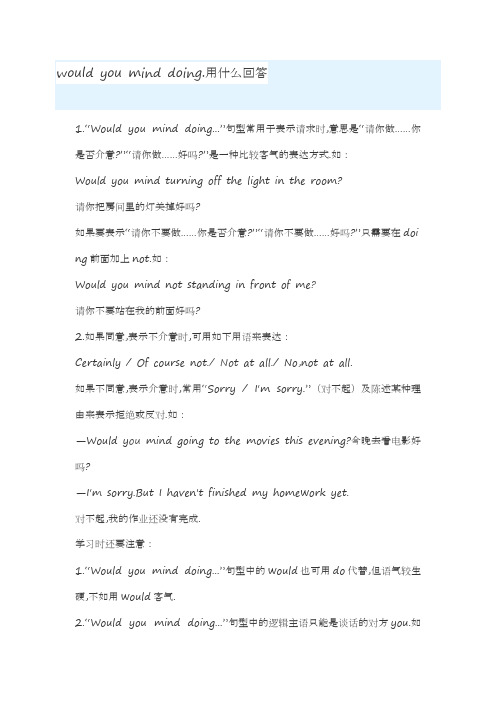
would you mind doing.用什么回答1.“Would you mind doing...”句型常用于表示请求时,意思是“请你做……你是否介意?”“请你做……好吗?”是一种比较客气的表达方式.如:Would you mind turning off the light in the room?请你把房间里的灯关掉好吗?如果要表示“请你不要做……你是否介意?”“请你不要做……好吗?”只需要在doi ng前面加上not.如:Would you mind not standing in front of me?请你不要站在我的前面好吗?2.如果同意,表示不介意时,可用如下用语来表达:Certainly / Of course not./ Not at all./ No,not at all.如果不同意,表示介意时,常用“Sorry / I'm sorry.”(对不起)及陈述某种理由来表示拒绝或反对.如:—Would you mind going to the movies this evening?今晚去看电影好吗?—I'm sorry.But I haven't finished my homework yet.对不起,我的作业还没有完成.学习时还要注意:1.“Would you mind doing...”句型中的would也可用do代替,但语气较生硬,不如用would客气.2.“Would you mind doing...”句型中的逻辑主语只能是谈话的对方you.如果想要对方允许自己做某事,可用“Would you mind my doing...”句型,如:Would you mind my smoking here?你介意我在这里吸烟吗?。
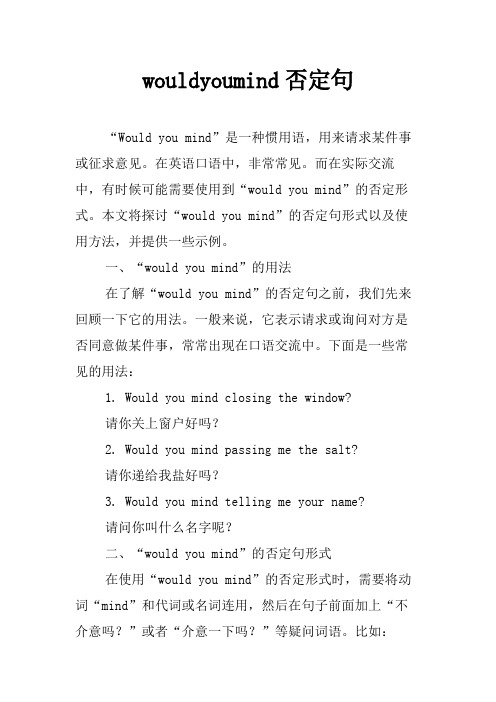
wouldyoumind否定句“Would you mind”是一种惯用语,用来请求某件事或征求意见。
在英语口语中,非常常见。
而在实际交流中,有时候可能需要使用到“would you mind”的否定形式。
本文将探讨“would you mind”的否定句形式以及使用方法,并提供一些示例。
一、“would you mind”的用法在了解“would you mind”的否定句之前,我们先来回顾一下它的用法。
一般来说,它表示请求或询问对方是否同意做某件事,常常出现在口语交流中。
下面是一些常见的用法:1. Would you mind closing the window?请你关上窗户好吗?2. Would you mind passing me the salt?请你递给我盐好吗?3. Would you mind telling me your name?请问你叫什么名字呢?二、“would you mind”的否定句形式在使用“would you mind”的否定形式时,需要将动词“mind”和代词或名词连用,然后在句子前面加上“不介意吗?”或者“介意一下吗?”等疑问词语。
比如:1. Would you mind not smoking here?(请不要在这里吸烟,介意一下吗?)2. Would you mind not making so much noise?(请不要制造那么多噪音,不介意吗?)3. Would you mind not interrupting me?(请不要打断我,介意一下吗?)三、“would you mind”的否定句用法示例1. Would you mind not wearing shoes inside the house?请不要在房子里穿鞋,介意一下吗?2. Would you mind not bringing your dog with you?请不要带狗来,不介意吗?3. Would you mind not talking so loudly?请不要讲那么大声,介意一下吗?4. Would you mind not smoking in the car?请不要在车里吸烟,不介意吗?5. Would you mind not using your cell phone in the library?请不要在图书馆使用手机,介意一下吗?四、总结“would you mind”是英语口语中非常实用的一种表达方式。
Wouldyoumind的⽤法和句型.Would you mind 后⾯⼀般加动词的进⾏式,即Would you mind + doing.例:Would you mind looking after my baby while I'm away?我不在的时候,你介意不介意照看⼀下我的⼩孩?常⽤⽤法还有:1. Would you mind + 名词宾格/形容词性物主代词 + doing.例:Would you mind me/my smoking here?你介意我在这⾥抽烟吗?Would you mind me/my opening the window?你介意我开窗户吗?2.Would you mind + if 从句。
例:Would you mind if I smoke?你介意我抽烟吗?Would you mind if I were to say...我这样说的话,你介意吗?Would you mind 句型⼀般⽤在⾯对陌⽣⼈时或者⾮常正式的场合,⽤来表达委婉、客⽓的意愿,不⽤在朋友之间,或者普通、随便的场合。
注意:Would you mind 后⾯不能加不定式,即to do评论(0)40其他回答(3)问问⽤⼼帮助⼤家⾼级团合作回答者:1⼈ 2012-04-01Would you like +名词/代词?表⽰客⽓地建议或邀请意为 你想要---?基本肯定答语:Yes, please.基本否定答语:No, thanks.这与Would you like to do something ?结构⽤法不同!Would you mind 后⾯⼀般加动词的进⾏式,即Would you mind + doing.例:Would you mind looking after my baby while I'm away?我不在的时候,你介意不介意照看⼀下我的⼩孩?常⽤⽤法还有:1. Would you mind + 名词宾格/形容词性物主代词 + doing.例:Would you mind me/my smoking here?你介意我在这⾥抽烟吗?Would you mind me/my opening the window?你介意我开窗户吗?2.Would you mind + if 从句。
透视Would you mind ...?的用法Would you mind ...?是一个非常重要的交际用语,用来表示委婉的请求,或用来表示希望得到对方的许可。
意为“劳驾”“你可否……?”“请你做……好吗?”。
学习此句型时应注意以下两点:一、结构1. Would you mind doing sth.表示希望对方做某事。
如:Would you mind closing the door?Would you mind helping me?注意:would可用do代替,只是用would 比do语气更委婉。
如:Would / Do you mind showing me the way to the airport?2. Would you mind one's doing sth. 用来表示请求允许或询问对方是否介意自己或别人做某事。
如:Would you mind my asking you a few questions? Would you mind my opening the window?注意:其中形容词性物主代词one's在口语中可用代词宾格担当动名词的逻辑主语。
Would you mind my/ me smoking here?3. Would you mind not doing ... ?否定式通常在doing的前面加not。
如:Would you mind not spitting everywhere? Would you mind not taking it?4. Would you mind +if从句。
用来表示请求对方是否介意某人做某事。
Would you mind if I took his place? Would you mind if I closed the window ?注意:在“Would you mind if 从句”句型中,从句谓语常用一般过去时,而“Do you mind if从句”句型中,从句谓语常用一般现在时。
Mind 用法一、 mind 用作名词时,意为“思想”、“想法”、“头脑”、“智力”。常见的含名词 mind 的短语有: change one’s mind(改变主意), make up one’s mind(下定决心),set one’s mind to(do)(专注于[做]……), keep... in mind(牢记……), come into one’s mind(浮现在脑海)等。二、 mind 用作动词时,意为“介意”、“反对”。常见的含动词 mind 的句式有:1. “Would/Do you mind doing sth?”意为“劳驾,……好吗?”或“请问,(你)可否……”,常用来表示委婉、客气的请求。例如:Would you mind closing the door? 劳驾,把门关上好吗?2.“Would/Do you mind + 人称代词宾格或形容词性物主代词+ doing sth?” 意为“某人做某事,你介意吗?”。例如:Do you mind my closing the window? 我把窗户关上,你介意吗?注意: “Would you mind...?”和“Do you mind...?”两种句式表达相同的意思,只是前者比后者的语气显得更客气、更委婉一些。两者后接从句时,前者从句中的谓语动词常用过去时,而后者的从句中的谓语动词则用一般现在时。试比较: Would you mind if I sat here?/Do you mind if I sit here? 我坐在这儿可以吗?对上述问句,需要使用一些客气、委婉的方式作反意回答。如果表示不反对或不介意,常用“No, not at all./Of course not./Certainly not./No, do it please. /No, please do./No, go ahead.”等作答。例如:—Do you mind passing me the dictionary? 劳驾,把那本词典递给我好吗?—No, not at all. 没问题。—Would you mind me smoking here? 我在这里抽烟你不见怪吧。—No, please do. 没关系,请便。2) 如果表示介意、不同意或不赞成某人做某事,回答时一般不要说“Yes, I mind”,这种回答很不客气,不符合英美人的表达习惯。通常用“Sorry, but I do.”或“Sorry./I’m sorry./I wish you wouldn’t.”,然后最好再陈述某种表示拒绝或反对的理由。例如:—Do you mind if I smoke here? 我在这里吸烟可以吗?—Sorry, but I do. 对不起,你不能。—Would you mind my turning off the light? 我把灯关掉行吗?—I wish you wouldn’t. I haven’t finished my work. 对不起,我还没有完成工作。3. “I don’t mind.” 意为“我不介意”、“随便”。例如:—Tea or coffee? 茶你要茶还是咖啡?—I don’t mind. 随便。4. “Never mind”意为“没关系”、“不要紧”,常应用于下列场合:1) 回答对方的致歉。例如:—I’m sorry. I came in a hurry and forgot to bring food. 对不起,我来得匆忙,忘记带吃的了。—Never mind. You can have ours. 没关系,你可以吃我们的。2) 安慰对方。例如:—Did you watch the baseball match yesterday? 昨天你看棒球比赛了吗?—No, I missed it. By the time I got there, it had already finished. 没有,我错过了。当我到达那里时,比赛已经结束了。—Never mind. It was a boring match. 没关系。那是一场枯燥乏味的比赛。3) 回答对方的求助。例如:—Sorry to trouble you. 抱歉,麻烦您一下。—Never mind. What can I do for you? 没关系。我能为你做些什么呢?[链接中考]1. Would you mind_____more slowly? I can’t follow you.A. speakB. spokeC. spokenD. speaking2. Do you mind_____the radio a little bit? I am doing my homework.A. turning offB. to turn downC. turning downD. turning up3. —Would you mind opening the window?—_____.A. Of course, open itB. Not at allB. CertainlyC. No, don’t do it4. —Do you mind if I take the seat?—_____. It’s for a gentleman named Bill.A. Better notB. Never mindC. Of courseD. Not at all5. —It’s too hot. Would you mind my_____the window?—_____. Do it as you like, please!A. to open; OKB. opening; Certainly notC. closing; Of courseD. open; Good idea6. —Would you mind my smoking here?—_____.A. Not at allB. I have no ideaC. Yes, please7. Would you mind_____me how_____English words?A. tell; to rememberB. telling; rememberC. telling; to rememberD. tell; remember8. —Mary is ill. When shall we go to see her, tonight or tomorrow night?—_____. Either night is OK.A. I’m sureB. I’m afraid notC. I d on’t knowD. I don’t mind9. —I’m terribly sorry to have stepped on your foot.—_____.A. Don’t say thatB. Never mindC. You’re welcomeD. That’s right10. —Do you mind opening the door for me?—_____.A. Yes, of course notB. Yes, pleaseC. No, of course notD. No, you can’t open it Key: 1-5 DCBAB6-10 ACDBC(注:专业文档是经验性极强的领域,无法思考和涵盖全面,素材和资料部分来自网络,供参考。
Would you mind是一个礼貌的口头表达,意思是希望对方能够配合,在有必要时才能请求他人做一些事情。
它可以使用在任何场合中,例如:T:Would you mind if I borrowed your pen?A:No, of course not.礼貌地提出请求,无论是在家庭生活中还是在工作中,都会有助于获得愉快的回应。
可以用这种口头表达来放松尴尬或紧张气氛,一般都能得到比较肯定的回复。
下面是一个更具体的例子:M:Would you mind if I took the last piece of cake?A:No, go ahead. It's fine with me.用would you mind的方式可以非常巧妙地暗示请求,但又不太强制。
通常,对方都会尊重你的请求,并且同意你的提议。
它还可以用来表达过渡阶段的不确定性,例如:T:Would you mind if I made a suggestion?A:No, go ahead.使用would you mind时有几点要记住:一定要仔细选择语言,特别是当你与比你职位高的人交谈时;永远不要让对方感到压力;当对方回答负面时,要尊重他的答案。
使用固定的格式表达would you mind彰显出你的礼貌和尊重,而且还可以增进沟通的效率。
一开始,也许当你说出would you mind时,有些紧张是正常的。
然而,随着使用的次数增加,你会发现这句礼貌的话语是可以改善你与他人关系的好手段。
总结Would you mind是一种礼貌的口头表达,意思是请求对方配合。
它可以用于家庭场景,工作场合,也可用于放松尴尬或紧张气氛。
使用would you mind来提出请求或表达不确定性时,要注意避免给对方施加压力。
只要我们用得当,它将是一种佳妙的人际交往工具。